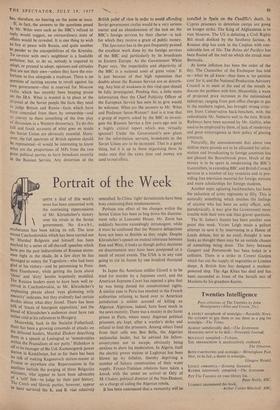Portrait of the Week QUITE a deal of this week's
news has been concerned with the continuing repercussions of Mr. Khrushchev's victory over his rivals in the Soviet \ government. No doubt, exuberance has been taking its toll. The tour round Czechoslovakia which has been carried out by Marshal Bulganin and himself has been marked by a series of off-the-cuff speeches which have put the past indiscretions of Russian states- men right in the shade. In a few days he has managed to annoy the Yugoslays—who had been glad at his victory—and be patronising to Presi- dent Eisenhower, while getting the facts about clean' and 'dirty' bombs hopelessly muddled. The Russian leaders seem to have been well re- ceived in Czechoslovakia, as Mr. Khrushchev's Impleasing phrase about 'eyes glistening with sincerity' indicates, but they evidently had certain doubts about what .they found. There has been talk of 'traces of bourgeois opposition,' and the blood of Khrushchev's audiences must have run rather cold at his references to Hungary.
Meanwhile, back in the Socialist 'Fatherland, there has been a growing crescendo of attacks on the defeated leaders, Marshal Zhukov describing them in a speech at Leningrad as 'monstrosities within the Praesidium of our party.' Malenkov is oft to be manager of the Usk-Kamenogorsk power station in Kazakhstan, but so far there has been no talk of making Kaganovich station-master at Frunze or anywhere else. Repercussions in the satellites include the purging of three Bulgarian Ministers, who appear to have been advocates __°f a 'soft' line—to judge by their past history. The Czech and Slovak parties, however, appear to have survived the K. and B. visit relatively unscathed. In China 'right' deviationists have been busy confessing their misdemeanours.
Perhaps one effect of the changes within the Soviet Union has been to bog down the disarma- ment talks at Lancaster House. Mr. Zorin has suddenly become exceedingly intransigent, while it must be confessed that the Western delegations have not been as flexible as they might. Despite Khrushchev's speech on mutual tolerance between East and West, it looks as though policy decisions on disarmament may have been postponed as a result of recent events. The USA is in any case going to cut its forces by one hundred thousand men.
In Japan the American soldier Girard is to be tried for murder by a Japanese court, and the American Supreme Court has rejected a plea that he was being denied his constitutional rights. A similar case in Paris has resulted in the French authorities refusing to hand over to American jurisdiction a soldier accused of killing an Algerian. Algerians, indeed, have been much in the news recently. There was a mutiny in the Sante prison in Paris, where many Algerian political prisoners are kept, after a warder's strike and refusal to feed the prisoners. Among others freed from their cells was Ben Bella, the Algerian nationalist leader, but he advised his fellow- countrymen not to escape, obviously being anxious to show his moderation. In Algeria itself the electric power station at Laghouat has been blown up by fellahin, thereby depriving a number of Sahara communities of their water supply. Franco-Tunisian relations have taken a knock with the arrest on arrival at Orly of Chaker, political director of the Neo-Destour, on a charge of aiding the Algerian rebels.
It has been announced that a monarchy will be installed in Spain on the Caudillo's death. In Cyprus prisoners in detention camps are going on hunger strike. The King of Afghanistan is to visit Moscow. The US is debating a Civil Rights Bill much disliked by the Southern faction. A Russian ship has sunk in the Caspian with con- siderable loss of life. The Reina del Pacifico has been floated off the reef on which she struck near Bermuda.
At home inflation has been the order of the day. The Chancellor of the Exchequer has told us—what we all knew—that there is `no painless cure' for it, and the National Production Advisory Council is to meet at the end of the month to discuss the problem with him. Meanwhile, a wave of projected price increases in the nationalised industries, ranging from post office charges to gas in the southern region, has brought strong critic- ism from Conservative back-benchers, with the redoubtable Mr. Nabarro well to the fore. British Railways have been accused by Mr. Gethin, who used to be employed by them, of lack of modernity and great extravagance in their policy of placing contracts.
Naturally, the announcement that about two million more pounds are to be allocated for infor- mation and broadcasting to foreign countries has not pleased the Beaverbrook press. Much of the money is to be spent in modernising the BBC's transmitters, in extending BBC and British Council services in a number of key countries and in pro- viding free television material for foreign stations and more scholarships for foreign students.
Another topic agitating backbenchers has been the reduction of army regiments to fifty. This is naturally something which touches the feelings of anyone who has been an army officer, and, paradoxically, it may give the Government more trouble with their own side than graver questions.
The St. James's theatre has been another sore point this week. Vivien Leigh made a gallant attempt to save it by intervening in a House of Lords debate, but to no avail, thought it now looks as thought there may be an outside chance of something being done. The ferry between Gosport and Portsmouth has been holed in a collision. There is a strike in Covent Garden which has cut the supply of vegetables to London shops. A British firm has designed a nuclear- powered ship. The Aga Khan has died and has been succeeded as Iman of the Ismaili sect of Moslems by his grandson Karim.














































 Previous page
Previous page